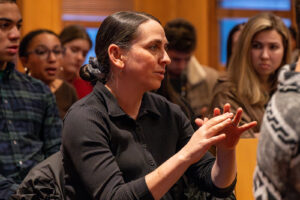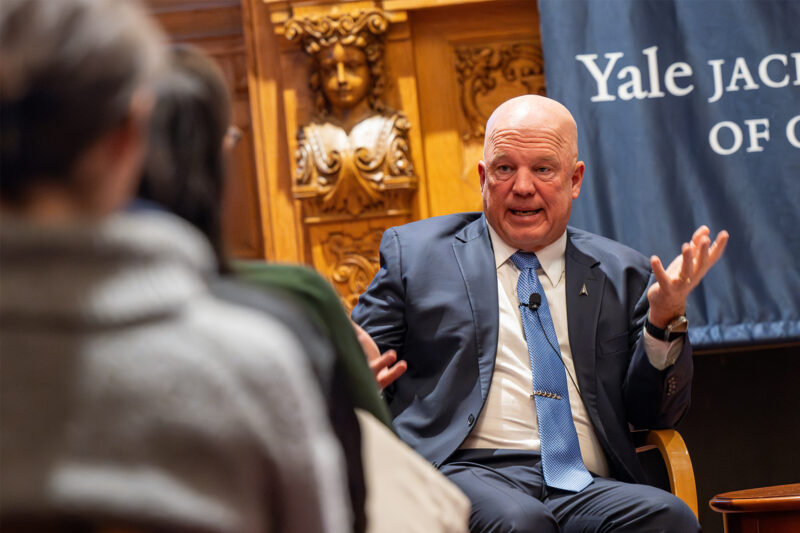Gen. Jay Raymond, the first chief of operations for the U.S. Space Force, presented at the Schmidt Program’s Outer Space Symposium in February.
A unique cross-section of the Yale community gathers in the Jackson School of Global Affairs’ Horchow Hall on a Monday afternoon. There are faculty, staff, undergraduate, and graduate students. A few students are in uniform, as members of Yale’s Reserve Officers’ Training Corps (ROTC) programs; others are engaged in studies focused on national security, emerging technologies, or various fields of science; some just have a deep interest in outer space.
They are gathered to listen to Peter Beshar, a Yale graduate and former general counsel of the U.S. Department of the Air Force, which includes the U.S. Space Force. He peppers the crowd with questions about astronomy and national security, mixing in stories about his travels — from Pituffik Space Base in the far north of Greenland to SpaceX’s bustling Starbase in southern Texas.
During his remarks, Beshar makes a stark declaration: “Whether we like it or not, space has the potential to become a war-fighting domain.”
This is the overarching theme of this semester’s Outer Space Symposium, a series of events that hosts space leaders from across public, private, and nonprofit sectors, who share their perspectives on national security challenges in the space domain. The symposium — sponsored by the Jackson School’s Schmidt Program on Artificial Intelligence, Emerging Technologies and National Power (with support from the Blue Center for Global Strategic Assessment) — has welcomed speakers that include former NASA administrator Sen. Bill Nelson and Gen. Jay Raymond, the first chief of operations for the U.S. Space Force.
The symposium is part of a larger Schmidt Program effort to build understanding of the strategic significance of space to American national security. Beginning this semester, Yale introduced a new course, “The Space Domain and Global Security,” co-taught by Schmidt Program director Ted Wittenstein and Col. Lester Oberg, commander of Yale’s Air Force ROTC. The wide-ranging curriculum gives students the opportunity to analyze the unique technical and legal features of the space domain, as well as their implications for defense policy and strategy. The course has also explored astronomy, the rise of the commercial space industry, and the role of public-private partnerships in ensuring the resilience of national space assets and the global space economy.
“Understanding the physics of what war-fighting in space would — and, more importantly, would not — look like, the capabilities that would be involved, the technologies that could be game-changing, the vulnerabilities of U.S. and allied space-based assets, and why current treaties, rules, and norms create a space environment where low-level conflict is essentially occurring on a daily basis — this is all essential to successfully competing and fighting in the space domain,” says Oberg. “Our students are learning about each of these areas and many more. Having future leaders that understand the nature of space warfare, and how it is different from other warfighting domains, is crucial to the national security of our nation.”
The idea for the course began last year, when Oberg sat in on Wittenstein’s “Artificial Intelligence, Emerging Technologies, and National Power” — the flagship course of the Schmidt Program. Through conversations, the two discussed the possibility of developing a course focused on outer space and national security, which would be a requirement for Air Force ROTC students.
They enlisted the help of Maxwell Zhu MPP ’26, who before Yale worked as a public sector consultant supporting the U.S. Space Force, as well as with the government relations team at space technology company Blue Origin. As a research assistant, Zhu helped develop the curriculum for the course.
“We believe this is first space policy course like this in the country and can serve as a model for similar courses in the future,” says Zhu.
Yale astronomy professor Marla Geha also lent her expertise to the course, advising on finer scientific points such as physics and orbital mechanics. She taught two classes this semester, focused on the physics of outer space and space exploration.
“Satellites in orbit around Earth obey the same laws of physics as objects on Earth, but the limiting factors are completely different,” says Geha, using the amount of fuel a satellite can carry as an example. “This severely limits how a satellite can maneuver or change orbits, fundamentally changing how a conflict might unfold.”
Though the course is required for second-year Air Force ROTC cadets, it has attracted many other Yale students, particularly those in the Schmidt Program. Oberg says the wide range of student perspectives has created unique dialogue in the classroom and expanded the academic benefit for each student.
“The knowledge and perspectives provided by students with a variety of backgrounds truly elevates the learning experience and understanding of the space domain,” Oberg says. “Within a class, you can have a Jackson student relating a discussion topic to national power, whereas an engineering student can explain the technical limitations and needed advancements. It really boosts the value of the course.”

The space policy course has seen increasing demand for enrollment since it was introduced and feedback from those enrolled this semester has been positive, says Oberg. The topics discussed in the symposium are tied to weekly course material and many of the students in the class have benefitted from engaging with the expert speakers.
“The speakers have offered invaluable insights drawn from their frontline experience in space policy, from founding the U.S. Space Force to navigating the recent ISS crisis,” says Zhu. “Their thoughtful engagement with both students and the larger Jackson community provided a window into space policy decision-making that textbooks can’t provide and helped future leaders understand how to approach the complex and multifaceted challenges in the space domain.”
Later this month, students in the class will engage in a space war game simulation, led by the U.S. Air Force Academy’s Eisenhower Center for Space and Defense Studies. The “game” incorporates national real-world policies, goals, and postures, and tests students’ space policy decision-making capabilities.
Moving forward, Wittenstein says, the increasing importance of understanding the outer space domain will create more opportunities for Yale students to engage in these unique and critical dialogues.
“This evolution in the uses of space and advances in space technology creates novel risks and vulnerabilities,” says Wittenstein. “I am grateful for our Schmidt Program partnership with the Yale ROTC, as we prepare the next generation of aspiring military and policy leaders to grapple with the wide array of threats and opportunities in orbit and beyond.”
